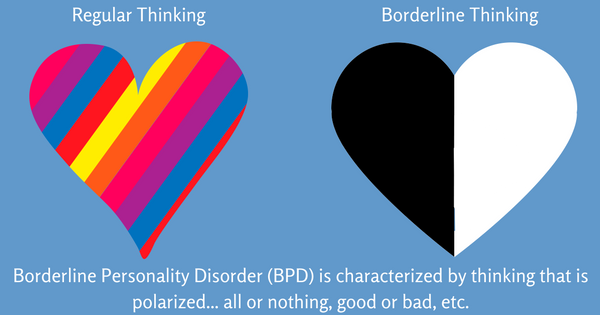 Pathways Real Life Recovery offers Borderline Personality Disorder treatment at our center in Sandy, Utah. We understand how Borderline Personality Disorder can affect your life and we can help you get back on track. Pathways has successfully helped individuals address the underlying issues that contribute to personality disorders, while simultaneously treating co-occurring issues like substance abuse. Learn more about our personality disorders treatment program below or call 801-895-3006 to speak to one of our caring advisors today.
Pathways Real Life Recovery offers Borderline Personality Disorder treatment at our center in Sandy, Utah. We understand how Borderline Personality Disorder can affect your life and we can help you get back on track. Pathways has successfully helped individuals address the underlying issues that contribute to personality disorders, while simultaneously treating co-occurring issues like substance abuse. Learn more about our personality disorders treatment program below or call 801-895-3006 to speak to one of our caring advisors today.
What is Borderline Personality Disorder?
Borderline Personality Disorder is a condition that impacts moods and emotions. Those with the condition experience great difficulty developing or retaining interpersonal relationships due to overwhelming feelings of worthlessness. These are accompanied by sudden, and otherwise unexplainable, bouts of anger, anxiety, impulsiveness and depression that may last for hours or a day, after which things return to a relative normal. Sadly, those with this condition often hurt those who love them, and they love, the most so that over time they may become very isolated and alone. People with BPD are likely to also suffer from simultaneous mental disorders such as mood, anxiety, eating, along with high rates of substance abuse, self-harm, suicidal thoughts/actions. These co-conditions only exacerbate the BPD as the individual already has a very negative self-image and the believe that he or she is “broken” and hopelessly flawed to the point of not deserving happiness or love despite any attempts of loved ones to try to dispel this thinking. Borderline Personality Disorder is a serious mental health disorder that too often the people affected do not recognize for what it is or seek treatment. But with treatment, you can overcome BPD and live a joyous and fulfilling life. If you think that you may have BPD, first, know that you do deserve to be happy. And, second, there is hope. At Pathways Real Life Recovery in Sandy, Utah we understand how BPD is impacting your life and stealing your joy. We know how to help you get your life back on track. Through customized treatment, we have helped many individuals take their life back from BPD and return to what they were meant to do -- live and love and work at their highest possible function.What Causes Borderline Personality Disorder?
There are no known causes of Borderline Personality Disorder. It is important to realize that if you have BPD, you did not cause it. Those researching the condition, currently believe that a combination of genetics and environment are major players in the development of BPD. But more research is needed to really understand how these may be triggering BPD. You may or may not have grown up with a parent, aunt, grandparent, etc. who showed symptoms, but those who have a near relative with the condition are 5 times more likely than the general public to develop BPD. Many people who have BPD report that they suffered from a traumatic event. This could be something like abuse, abandonment or severe bullying. But it is important to realize that what is traumatic for one person may not be for another, so the trigger could have been something like prolonged exposure to unstable people, relationships or heated arguments among adults. Because everyone is different, many people with BPD cannot recall a specific event or prolonged trauma, and others who were exposed to great trauma never develop the disorder. This further makes the case that it is a combination of factors and cannot be isolated to one cause. One thing that is very clear to researchers is that the structure and function in the brain is changed, particularly in the parts that control impulses and regulate emotion. But they have found people who do not demonstrate symptoms of BPD who have similar brain patterns, so more research is needed.
You may or may not have grown up with a parent, aunt, grandparent, etc. who showed symptoms, but those who have a near relative with the condition are 5 times more likely than the general public to develop BPD. Many people who have BPD report that they suffered from a traumatic event. This could be something like abuse, abandonment or severe bullying. But it is important to realize that what is traumatic for one person may not be for another, so the trigger could have been something like prolonged exposure to unstable people, relationships or heated arguments among adults. Because everyone is different, many people with BPD cannot recall a specific event or prolonged trauma, and others who were exposed to great trauma never develop the disorder. This further makes the case that it is a combination of factors and cannot be isolated to one cause. One thing that is very clear to researchers is that the structure and function in the brain is changed, particularly in the parts that control impulses and regulate emotion. But they have found people who do not demonstrate symptoms of BPD who have similar brain patterns, so more research is needed.
Getting Diagnosed with BPD?
Borderline Personality very often goes undiagnosed or misdiagnosed because many of the symptoms are similar to other conditions and often the person has more than one condition. A licensed mental health professional will need to discuss family history and symptoms to determine the best treatment.Treatment of Borderline Personality Disorder
Treatments must be customized for the individual because the condition can manifest in different ways. A team of mental health professionals will consider severity, age, overall health, medical history, tolerance or response to certain medications, treatments and therapies. Your expectations and what you want to achieve are very important in developing a treatment plan that is right for you. BPD Treatments could include:- Cognitive Behavioral Therapy (CBT)- Negative thought patterns are challenged in order to alter negative thinking. This helps dispel the feelings of worthlessness, anxiety or other thought patterns that may be negatively impacting the individual’s ability to function.
- Dialectical Behavioral Therapy (DBT)- A subset of CBT, teaches skills needed to handle sudden emotional events that may cause an extreme reaction in someone with BPD. Through developing these skills, the person is better able to respond to life events.
- Schema-Focused Therapy- Combines several types of therapy into a unified program to help treat the whole person and condition at once.
- Interpersonal Psychotherapy (IPT)- Focuses on treating interpersonal dysfunction to improve the relationship with self and others.
- Family-Focused Therapy- A combination of therapy and education, intended to help the patient and the family better understand the condition
- Systems Training for Emotional Predictability and Problem Solving (STEPPS)- Most commonly conducted in a classroom setting run by licensed professionals, students perform exercises to learn life skills needed to better manage BPD
- Medications- Various medications may also be prescribed to control symptoms, during which the person receives other therapies with more lasting benefits.
- Self-Care- We often underestimate just how much things like diet and exercise impact us mentally. Regular exercise, proper nutrition, stress management, improving sleep patterns, hygiene is shown to help reduce symptoms such as mood swings, impulsive behavior or irritability.

